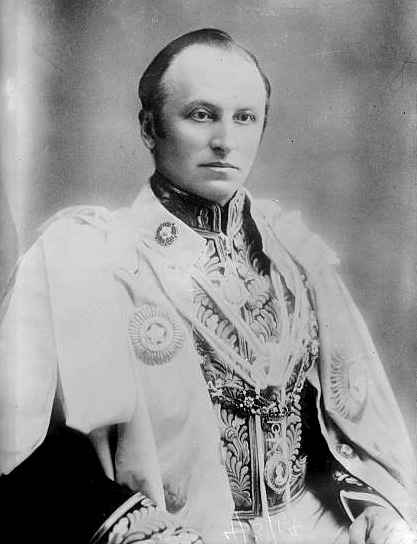Zdroj: [Budil, Ivo T., 2015, Triumf rasismu, Triton, 52, 9788073877507]
George Curzon citáty a výroky
George Curzon: Citáty anglicky
Virtual Caliphate: Exposing the Islamist State on the Internet, p. 26, Yaakov Lappin
Misattributed
Speech http://hansard.millbanksystems.com/lords/1918/nov/18/the-armistice-address-to-his-majesty in the House of Lords (18 November 1918).
Speech http://hansard.millbanksystems.com/lords/1918/nov/18/the-armistice-address-to-his-majesty in the House of Lords (18 November 1918).
Speech at the Byculla Club in Bombay (16 November 1905) two days before he left India, quoted in Lord Curzon in India, Being A Selection from His Speeches as Viceroy & Governor-General of India 1898-1905 (London: Macmillan, 1906), pp. 589-590.
There is no record of this alleged statement made by Lord Curzon in the House of Commons. It is a forged quote by radical Islamist extremists like the Islamic Thinkers group, and Hizb ut-Tahrir members such as Khondakar Golam Mowla.
Misattributed
“Obstinate, tiresome and stupid.”
Curzon's opinion of Canadian Prime Minister William Lyon Mackenzie King, quoted in Nicholas Mansergh, The Commonwealth Experience (London: Weidenfeld and Nicolson, 1969), p. 224.
Letter to Lord Minto (1907), quoted in Nicholas Mansergh, The Commonwealth Experience (London: Weidenfeld and Nicolson, 1969), p. 256.
“The miracle of the world…the biggest thing that the English are doing anywhere.”
On British rule in India, quoted in Nicholas Mansergh, The Commonwealth Experience (London: Weidenfeld and Nicolson, 1969), p. 256.
King Albert I of Belgium's diary entry (7 February 1916), quoted in R. van Overstraeten (ed.), The War Diaries of Albert I King of the Belgians (1954), p. 85.
“If I had done nothing else in India I have written my name here, and the letters are a living joy.”
Letter to Mrs Curzon (4 April 1905) on his restoration of the Taj Mahal, quoted in David Gilmour, ‘ Curzon, George Nathaniel, Marquess Curzon of Kedleston (1859–1925) http://www.oxforddnb.com/view/article/32680’, Oxford Dictionary of National Biography, Oxford University Press, 2004; online edn, Jan 2011, accessed 1 Feb 2014.
Budget Speech (25 March 1903), quoted in Lord Curzon in India, Being A Selection from His Speeches as Viceroy & Governor-General of India 1898-1905 (London: Macmillan, 1906), pp. 308-309.
Nicholas Mansergh, The Commonwealth Experience (London: Weidenfeld and Nicolson, 1969), p. 256.
Speech as the Chancellor of the Calcutta University in Calcutta (15 February 1902), quoted in Lord Curzon in India, Being A Selection from His Speeches as Viceroy & Governor-General of India 1898-1905 (London: Macmillan, 1906), p. 489.
“[Frenchmen] are not the sort of people one would go tiger-shooting with.”
Leonard Mosley, Curzon: The End of an Epoch (London: Longmans, 1960), p. 210.
The Middle East, Abstracts and Index, Volume 30, Part 4, p. 39
Misattributed
“The very epitome of snobbishness and embodiment of the exclusive hereditary principle.”
A. D. Harvey, Collision of Empires. Britain in Three World Wars, 1793-1945 (London: Phoenix, 1994), p. 460.
About Curzon
“The symbol of Empire in its noon-tide splendour.”
Nicholas Mansergh, The Commonwealth Experience (London: Weidenfeld and Nicolson, 1969), p. 5.
About Curzon
Lord Haldane in the House of Lords http://hansard.millbanksystems.com/lords/1925/mar/23/tribute-to-the-late-lord-curzon (23 March 1925).
About Curzon
Maurice Hankey's diary entry (12 May 1916), quoted in Stephen Roskill, Hankey, Man of Secrets: Volume I 1877-1919 (London: Collins, 1970), pp. 271-272.
About Curzon
Lord Curzon, while Viceroy of India, in his address at the Great Delhi Durbar in 1901. Quoted from Stephen Knapp, Mysteries of the Ancient Vedic Empire https://stephenknapp.wordpress.com/2015/10/30/a-look-at-india-from-the-views-of-other-scholars/
“The obstacle has been Mackenzie King, the Canadian, who is both obstinate, tiresome and stupid.”
Zdroj: Letter to his wife during the 1923 Imperial Conference (8 November 1923), quoted in Terry Reardon, Winston Churchill and Mackenzie King: So Similar, So Different (2012), pp. 52-53
